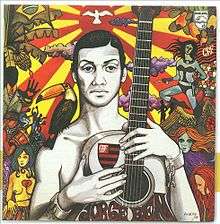Jorge Ben (album)
| Jorge Ben | ||||
|---|---|---|---|---|
 | ||||
| Studio album by Jorge Ben | ||||
| Released | 1969 | |||
| Genre | Tropicália, samba rock | |||
| Length | 38:35 | |||
| Label |
Universal Music[1] Dusty Groove (reissue) [2] | |||
| Producer | Roberto Corte Real[3] | |||
| Jorge Ben chronology | ||||
| ||||
| Professional ratings | |
|---|---|
| Review scores | |
| Source | Rating |
| Allmusic | |
Jorge Ben is the sixth studio album of the Brazilian artist Jorge Ben.
Released in 1969, it is Jorge Ben's first album with Trio Mocotó.[5] The self-titled album is said to have influenced the Tropicália movement, with Gal Costa recording "Que Pena" and "País Tropical" in her first self-titled album, also released in 1969.[4] "País Tropical" turned out to be Jorge Ben's most famous song in Brazil.[6] In the album cover, Jorge Ben pays homage to Brazilian football club Flamengo, with the team's crest appearing on his guitar body.
Track listing
All songs written by Jorge Ben.
| No. | Title | Length |
|---|---|---|
| 1. | "Crioula" | 3:30 |
| 2. | "Domingas" | 3:35 |
| 3. | "Cadê Teresa" | 3:26 |
| 4. | "Barbarella" | 3:19 |
| 5. | "País Tropical" | 4:16 |
| 6. | "Take it Easy my Brother Charles" | 2:36 |
| 7. | "Descobri que Eu Sou um Anjo" | 4:05 |
| 8. | "Bebete Vãobora" | 2:38 |
| 9. | "Quem Foi que Roubou a Sopeira de Porcelana Chinesa que a Vovó Ganhou da Baronesa?" | 3:10 |
| 10. | "Que Pena" | 3:05 |
| 11. | "Charles Anjo 45" | 4:55 |
References
- ↑ "Discos". Jorge Ben Jor. Retrieved 2014-02-07.
- ↑ "Jorge Ben – Jorge Ben". Retrieved July 1, 2014.
- ↑
- 1 2 Jureck, Thom "Jorge Ben - Jorge Ben'". Allmusic.com. Retrieved 2014-02-02.
- ↑ "Cliquemusic : Disco : JORGE BEN". Cliquemusic.uol.com.br. Retrieved 2014-02-07.
- ↑ ALEXANDRE, Ricardo. Nem vem que não tem: a vida e o veneno de Wilson Simonal. São Paulo: Globo, 2009. ISBN 978-85-250-4728-1
This article is issued from Wikipedia - version of the 10/2/2016. The text is available under the Creative Commons Attribution/Share Alike but additional terms may apply for the media files.